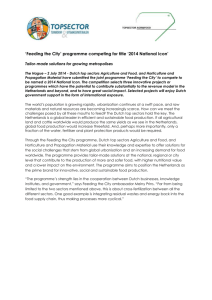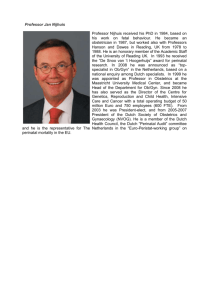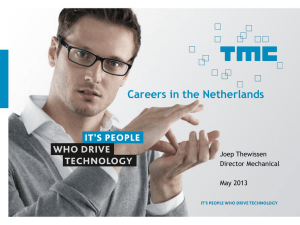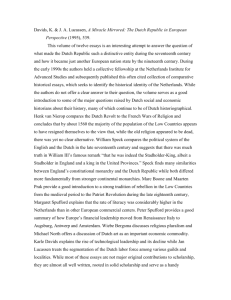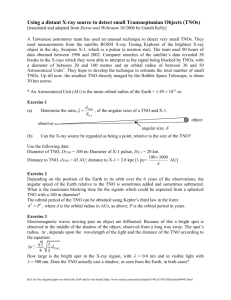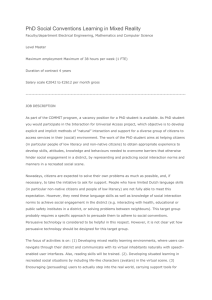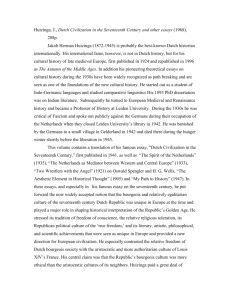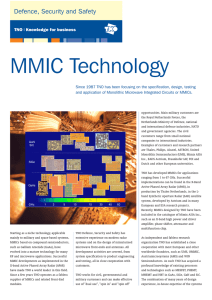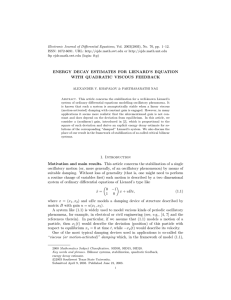Calcalist 11 March 2013-English
advertisement
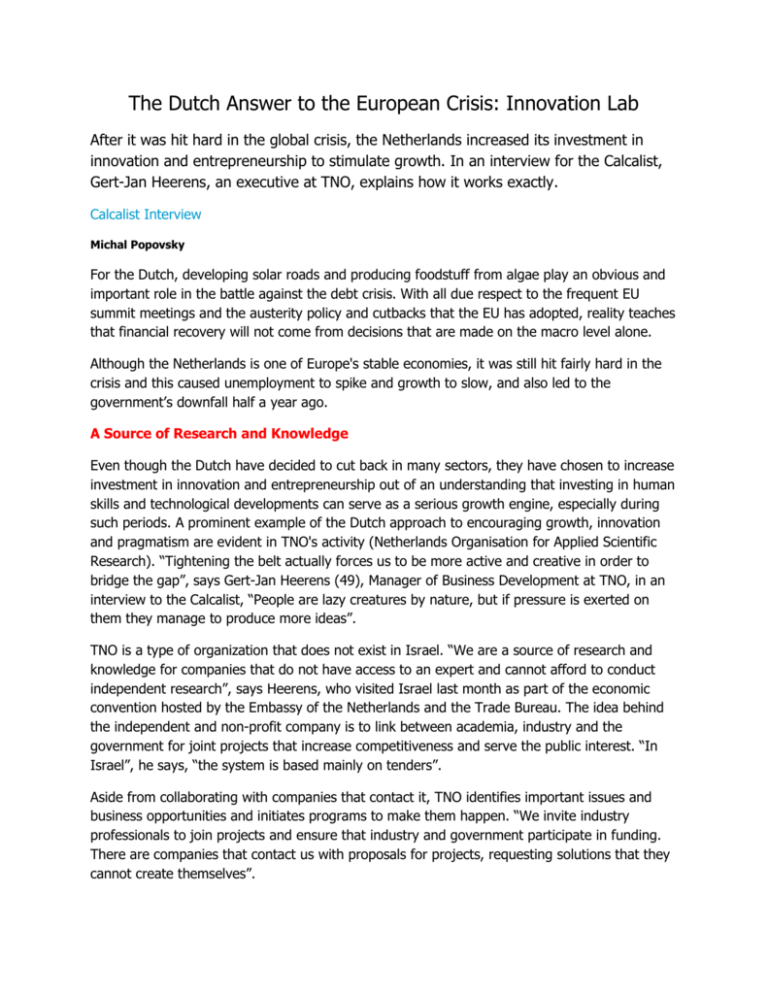
The Dutch Answer to the European Crisis: Innovation Lab After it was hit hard in the global crisis, the Netherlands increased its investment in innovation and entrepreneurship to stimulate growth. In an interview for the Calcalist, Gert-Jan Heerens, an executive at TNO, explains how it works exactly. Calcalist Interview Michal Popovsky For the Dutch, developing solar roads and producing foodstuff from algae play an obvious and important role in the battle against the debt crisis. With all due respect to the frequent EU summit meetings and the austerity policy and cutbacks that the EU has adopted, reality teaches that financial recovery will not come from decisions that are made on the macro level alone. Although the Netherlands is one of Europe's stable economies, it was still hit fairly hard in the crisis and this caused unemployment to spike and growth to slow, and also led to the government’s downfall half a year ago. A Source of Research and Knowledge Even though the Dutch have decided to cut back in many sectors, they have chosen to increase investment in innovation and entrepreneurship out of an understanding that investing in human skills and technological developments can serve as a serious growth engine, especially during such periods. A prominent example of the Dutch approach to encouraging growth, innovation and pragmatism are evident in TNO's activity (Netherlands Organisation for Applied Scientific Research). “Tightening the belt actually forces us to be more active and creative in order to bridge the gap”, says Gert-Jan Heerens (49), Manager of Business Development at TNO, in an interview to the Calcalist, “People are lazy creatures by nature, but if pressure is exerted on them they manage to produce more ideas”. TNO is a type of organization that does not exist in Israel. “We are a source of research and knowledge for companies that do not have access to an expert and cannot afford to conduct independent research”, says Heerens, who visited Israel last month as part of the economic convention hosted by the Embassy of the Netherlands and the Trade Bureau. The idea behind the independent and non-profit company is to link between academia, industry and the government for joint projects that increase competitiveness and serve the public interest. “In Israel”, he says, “the system is based mainly on tenders”. Aside from collaborating with companies that contact it, TNO identifies important issues and business opportunities and initiates programs to make them happen. “We invite industry professionals to join projects and ensure that industry and government participate in funding. There are companies that contact us with proposals for projects, requesting solutions that they cannot create themselves”. For example, TNO is involved in a solar road project, where a thick layer of silicon solar cells are laid on a road and covered with a thick layer of glass. These panels are capable of producing potential 50 kilowatts of energy per square meter per year, electricity that can be used for street lighting, traffic lights, and households. How did such a project develop? “We identified the potential of using roads as surfaces for energy production. We checked with the solar panel manufacturer if it was possible, we brought our own research knowledge, initiated a proposal and tried to engage as many entities as possible. We managed to obtain the local government’s support in one of the cities that let us conduct the pilot and we took it from there. With these projects, everyone pays their share”. How is the funding distributed? “The subsidies generally amount to up to 45%. The majority comes from industry. In general, TNO is partially financed by the government (25% of the turnover). The remainder comes from B2B transactions between local companies or with global corporations, and from the Ministry of Defense, with which we collaborate extensively”. To Reduce Toxic Gas Emissions TNO is also involved in developing a technology aimed at reducing the equipment that the Netherlands’ large chemical industry uses, to streamline the process and reduce toxic gas emissions. “This is an extensive process that requires large investments, which no company will enter on its own”, says Heerens. “For such a project, our roles are to integrate, establish, and consolidate. Sometimes our added value is less with research and more with integration. However, our ability to consolidate everything can cause a significant change”. Heerens states that already back in the 1920's the Netherlands realized that a large portion of the economy is based on small to medium companies or family-owned businesses, which need to be bolstered. “Also, these companies require highly skilled experts”, says Heerens. “The problem is that professors and scientists at the universities do not have the same drive and motivation that they do in industry, and they do not speak the same language as the entrepreneurs, who come from “the bottom” and need this expertise to improve their products. The government realized that only if these studies are removed from the universities will it be possible to hone the skills required to develop the expertise”. The concentration of 4,500 researchers and vast amounts of knowledge in one organization enables the transfer of expertise among the various industries, the majority of which does not occur in the absence of a mediating entity. This knowledge transfer can create solutions in much shorter time spans. “When you design armed vehicles, for example, you gather knowledge about explosions, shock waves and so forth. This knowledge can be used to develop a production platform that is more resistant to explosions, which can also be used in the chemical industry or in the gas and crude oil industry. Radar technology, which was originally developed to identify short range missiles, can also be used to identify crude oil leaks, because they are essentially the same algorithms. This information is available to industry as a whole, albeit not for free, but it has access to it”. How can long term projects be developed in a changing economic and political reality? “The Dutch economy relies predominantly on export, mainly to European countries, but it has decreased significantly since the crisis. In such a time, the need for innovation becomes even more prominent, which is why the last two governments instituted the Top Sectors policy. As part of this policy, nine key sectors were identified, such as energy, chemicals, and high tech, and the government supports them immensely. Therefore, even if our direct budget is cut, the industries with which we work receive incentives”. “Last September, the government was replaced (after the previous one collapsed because of the crisis – R&D), but it is enthusiastically continuing with the Top Sectors policy. So, in effect, the basic situation is fixed and known to all. This is especially important in the R&D industry, because sometimes a decade can pass from the conceptual stage to the product stage”. In practice, in 2012 the Dutch parliament presented a program that plans to transform the country into one of the five largest knowledge economies in the world by the year 2020, mainly by increasing investments in research and innovation. A Small Country among Large States Heerens believes that like Israel, the Dutch inclination to innovation stems from it being a small country among large neighbors. “When you are born in a small country you adopt certain customs. You have to know how to communicate with countries, trade with them, and find sophisticated ways to overcome great challenges. Since the beginning we had to build dams, windmills, and so forth. These were the innovative technological developments of that period”. Heerens believes that the key to the Dutch’s ability to utilize natural resources and implement large scale public projects is collaboration skills. “Maintaining dam and windmill projects required communication between the various districts. Discussions and negotiations are the Dutch’s forte. When an agreement between the parties has been reached, you can continue. This is also how we conduct ourselves in trade with other countries and in collaboration among industries”. Perhaps Israel can learn an interesting lesson in these domains as well. Algae and Sun at the Dutch’s Service Examples of Innovation Solaroad Solar panels are laid on roads and covered with a thick layer of glass. The electricity produced is used for street lighting, traffic lights and households. Algae for a Sustainable Future (GAIA) A joint project with Ingrepro, the algae company, which explores ways to produce food components from algae that will be a sustainable replacement for meat and a source of healthy plant oil. LNG at the Port of Rotterdam Collaboration with the local government in Rotterdam: The diesel in the ships docking at the port is replaced with liquid natural gas (LNG) to reduce pollution and transport costs. TNO Established in: 1932 Number of employees: 4,500 Definition: An independent research NPO that works with private companies, government entities and public organizations Areas of activity: Energy, industry, environment, defense, transport, IT Fact: The Netherlands is the only country whose Ministry of Defense does not conduct its own independent research. TNO is responsible for it. [Photo caption] Gert-Jan Heerens. “People are lazy by nature”

